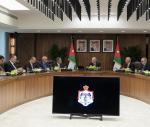You are here
Strengthening South Korea's new strategic posture
Jan 19,2023 - Last updated at Jan 19,2023
SEOUL — The geopolitical terrain in Northeast Asia is shifting, and, fortunately, the region’s two great democracies, Japan and South Korea, are moving in a similar direction. If prudent, strategic leadership prevails in both Tokyo and Seoul, the two countries’ historical enmity may finally be consigned to the past, and security across the Indo-Pacific region will be enhanced.
The catalyst for reducing the bilateral diplomatic friction, a problem that dates to the pre-World War II era, was Yoon Suk-yeol’s (no relation) inauguration as president of the Republic of Korea last May. With Yoon’s arrival in the presidential office, the pursuit of a chimerical “balance” in relations with China and the United States, previously a central focus of South Korea’s foreign policy, has given way to a more clear-eyed assessment of the country’s security needs.
Russia’s invasion of Ukraine was a rude awakening for Yoon, and for many South Koreans across the political spectrum. With China and others effectively backing Russian President Vladimir Putin, the war has called into question the entire international security architecture. Add the mounting North Korean nuclear threat, the intensifying Sino-American rivalry, and the risk that China will mimic Russia’s invasion with a similar move against Taiwan, and Yoon had more than enough evidence that South Korean national security requires closer ties with both the US and Japan.
But while the US and Japan have assumed a more prominent position in the minds of South Korean strategists, Yoon’s government has not turned its back on relations with China. On the contrary, his administration remains focused on limiting tensions and securing China’s assistance in reining in North Korea’s wayward leader, Kim Jong-un. But, unlike his predecessor, Moon Jae-in, Yoon does not think that South Korea needs to create a false sense of distance from the US in order to foster ties with Chinese President Xi Jinping.
For Yoon, recognising South Korea’s new national-security needs has meant embracing a more active and outward-looking diplomatic posture. He wants to position South Korea as a pivotal player in maintaining the international order, rather than as a small regional power concerned only with relations on the Korean Peninsula.
One problem for Yoon, whose margin of victory over his more left-wing opponent was just 0.74 per cent, is the level of domestic political support for a major foreign-policy shift. Given South Korea’s winner-takes-all political system, in which presidents are limited to a single five-year term, many worry that any major foreign-policy changes could be summarily reversed as soon as 2027. With the next presidential election not due until then, Yoon has time to secure such a consensus if he works hard at it.
So, as significant as South Korea’s strategic reorientation under Yoon appears to be, it will remain on shaky ground without more formal institutionalisation, both in South Korea and among its allies, particularly Japan and the US. That is why Yoon’s government, instead of waiting for Japan to make the first move (as is typical of South Korean diplomacy), has been reaching out and seeking to revive the warm ties that typified the relationship between South Korean President Kim Dae-jung and Japanese Prime Minister Keizō Obuchi from 1998 to 2000.
One must hope that this effort bears fruit soon. But the strength of the bilateral relationship ultimately depends on the trilateral relationship between Japan, South Korea and the US, and there are many more things that these three countries could be doing to deepen their ties. Specialists at a trilateral conference organised by the Mansfield Foundation last summer proposed dozens of policy recommendations. For example, meetings of the three countries’ defence and foreign ministers (“2+2+2 summits”) could be held regularly to build trust, improve policy coordination, and develop more effective responses to shared risks, such as the security threat posed by North Korea.
Joint trust-building initiatives could also be pursued in strategic research and development sectors such as next-generation semiconductors, aerospace technology, 5G and 6G communications, artificial intelligence, and quantum computing. The US National Science Foundation, the Japanese New Energy and Industrial Technology Development Organisation, and the National Research Foundation of Korea could all coordinate their efforts in these domains.
Equally important are deeper people-to-people ties among the three countries. For example, exchange programmes, especially for young people, media figures and other “influencers”, could help to create a shared community and build greater public support for a deepening trilateral alliance.
More broadly, South Korea also will need to strengthen its participation in multilateral institutions and networks, so that it can work with other countries to provide international public goods, mitigate supply-chain problems, and address other global issues. Perhaps the most important body that South Korea should seek to join is the group of Indo-Pacific democracies known as the Quad, comprising Australia, Japan, India and the US.
While Quad members currently lack the political will to expand, the opportunity to tie South Korea to it should not be missed. South Korea should also actively pursue membership in other vital multilateral international networks such as the G-7; US President Joe Biden’s Indo-Pacific Economic Framework initiative; the proposed Chip 4 Alliance (US, Japan, South Korea, and Taiwan), intended to strengthen control of and access to semiconductor production; and the Comprehensive and Progressive Agreement for Trans-Pacific Partnership, the vast trans-Pacific trading bloc.
Strong, forward-looking South Korean and Japanese leadership will be needed to seize these opportunities, and to mobilise broader regional and global networks. But, as is often the case, US leadership is needed to maintain today’s current momentum.
The 2022 US National Security Strategy calls for investment in US national power and alignment with allies and partners to out-compete China and constrain Russia. But the Biden administration does not yet have an effective plan for uniting allies and like-minded countries behind shared security goals.
One reason for this is the traditional US failure to consider the impact of its domestic policies on its foreign-policy interests. For example, France, South Korea and others have been complaining loudly about being excluded from new US industrial policies (such as the Inflation Reduction Act’s tax credits for US-produced electric vehicles).
While Biden has pledged to address these concerns, he must do so quickly. Alliances, after all, are built on trust. And trust will be the essential ingredient in shaping a security alliance worthy of Asia’s great democracies.
Yoon Young-kwan, a former minister of foreign affairs of the Republic of Korea, is Professor Emeritus of International Relations at Seoul National University. Copyright: Project Syndicate, 2023.











